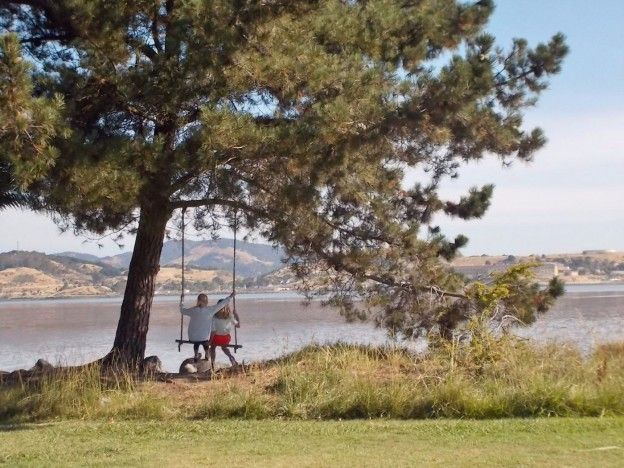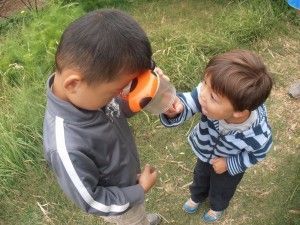5 reasons why your child needs unstructured outdoor play time
June 9, 2015 | Amy Diiullo

Make way for play!
Summer or not, our days are usually hectic, sometimes over-scheduled, and always filled with things to do. So, how are you going to fill your child’s 70 (give or take) days off from school this summer? Don’t. Yup, you heard (errr, read) right. Don’t. Instead, open the door, step back and let your child venture outside. It’s time for some unstructured outdoor play. What exactly is “unstructured or free play,” you ask? It’s time that’s not planned, guided and just unfolds naturally – and kids need more of it.
Yes, yes, scheduled classes, activities and teams are all important. Equally, if not more important, though, is letting your kids be outside, creating their own adventures in the world around them. I know it can be a challenge for some parents, but left to their own devices and without parent’s interventions, kids are opened up to a world of possibilities (and, “No,” I’m not advocating tossing safety over the backyard fence). Why, you may wonder, would you ever let your child participate in unstructured outdoor play? Let’s take a look . . .
- Teaches responsible decision-making: As kids discover new interests and test the waters, they may push limits. But, we know there are risks involved with everything, and risk isn’t inherently bad. Kids learn life-long skills when they’re taught to assess situations and make good choices. Is it a good idea to ride your bike over a homemade cardboard box ramp? Not particularly, but your child will come to that conclusion on his own using the critical thinking skills he’s developed through unstructured outdoor play. Curious about how to support your child with positive risk taking? We’ve got some great information for you on our blog post, 6 things to do to support positive risk taking in kids.
- Helps brain development: Playing without coaches, rules and parents encourages kids to work together to create and play games, navigate activities, and, generally, get along and develop friendships. Kids learn that the world doesn’t revolve around them (shocking, I know), and being a bossy boots won’t make friends. Social interactions for kids (and, well, adults, too) are complicated, and free play helps the brain develop skills to manage these situations. For more information about research play and brain development, take a look at Scientists Say Child’s Play Helps Build A Better Brain.
- Fosters creativity: Kids are awesome at creating games and activities with whatever they find. Have you ever seen what they can come up with using a garden hose, a slip and slide, a sled, a pool noodle, a ball and some hockey sticks? (This happened at my house this afternoon. Not kidding either.) Throw in some water balloons, and you’ve got yourself a party. Practice letting your child be bored, and you will quickly see what activities their imaginations concoct. Their creativeness will burst to the surface.
- Boosts confidence: When kids are encouraged to try activities, they build skills and learn tools to be successful in life. As confidence increases, kids are more inclined to reach beyond their comfort zone and grow. Whether kids succeed or fail, it doesn’t matter. They learn from every experience.
- Encourages self discovery: If you had 2 hours to yourself, you might go for a bike ride, read or take a hike (you know, after you relish in the fact you actually have a bit of free time). You know what you like and how you’d like to spend your precious free time. Kids, on the other hand, need to discover their passions, and what better way than to have some free play time to explore? Maybe you have an entomologist looking to discover the next insect species or a scientist waiting to experiment (in a good way, of course) on what’s living inside a water sample. Let your kiddos discover who they are and what they enjoy.
 You’re probably wondering how you’re going to schedule unstructured play time into an already scheduled day. Make pockets of time in your day to play. Unstructured play isn’t supposed to be stressful. Once you let it happen, your work is done. Let your kiddos use their senses and observation skills to learn about the world and themselves – and then let them follow their interests. Sounds fun, right?
You’re probably wondering how you’re going to schedule unstructured play time into an already scheduled day. Make pockets of time in your day to play. Unstructured play isn’t supposed to be stressful. Once you let it happen, your work is done. Let your kiddos use their senses and observation skills to learn about the world and themselves – and then let them follow their interests. Sounds fun, right?
Avid4 Adventure offers experiences that challenge your child’s curiosity of nature while nurturing their decision-making and confidence. With their new-found confidence and skills, kids are excited to continue the adventure after camp. Avid4 Adventure activities are close to local outdoor recreation spots, so kids can share their skills and adventures with friends and families long after camp is over.
Be sure to like us on Facebook to the get latest Avid4 Adventure news and subscribe to our blog posts to stay in touch for tips and tricks on how to best get outside as a family or to check out previous posts for even more fun summer ideas!
About the Author: Lynne Marsala Basche spent most of her career on the island of Manhattan at two New York publishing companies. A multi-year Avid4 Adventure mom and a new contributor to the Avid4 Adventure website, Lynne’s writing adventures also take her to championing volunteerism and regional recreation stories as a staff writer for the Castle Pines Connection newspaper, as well as supporting separate large corporate communications programs. By trying to keep pace with her mountain biking, rock climbing, snowboarding, lacrosse playing, unicycling, tae kwon do-loving 11-year old son, she, like most Avid4 parents, loves sharing the value of outdoor recreation and its positive influence on children’s health and confidence development. Lynne lives in Castle Pines, Colorado and regularly immerses herself in outdoor activities with her family where she also runs her freelance writing company, Blue Spruce Creative
Tagged: benefits of outdoor activities, getting kids outside, kids and nature, kids outdoor activities






